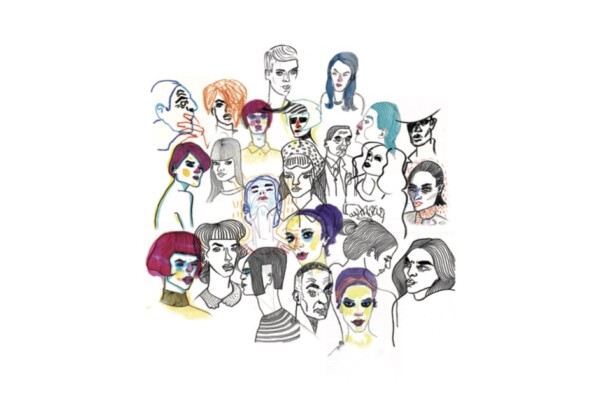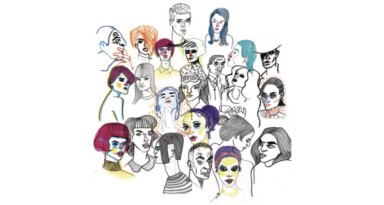“All the arts which belong to polished life have some common tie, and are connected as it were by some relationship.”
- Cicero
The 20th-century English poet Philip Larkin wrote about mortality with terrible eloquence. His last great poem, 1977’s Aubade, dismisses with contempt the “specious stuff” that claims:
No rational being
Can fear a thing it will not feel.
Larkin knew that nothingness is precisely what we fear:
No sight, no sound,
No touch or taste or smell, nothing to think with,
Nothing to love or link with...
To live is to be linked to a living world, as one tiny part of its totality. To die is to be disconnected – cut off forever from love and life.
Life is connection. We are linked to every creature that has ever lived, just as our continued existence is wholly dependent upon other living things. But we are also connected to one another with a complexity no other creature can match. Ants and bees may have hive minds in a sense we can hardly imagine. Yet they have nothing on humanity when it comes to the world-spanning networks of technology, culture and communication that define our species. Our collective life is the richest, strangest and most potent thing this planet has ever seen.
For thinkers like the American social psychologist Kenneth Gergen, the very idea that “you” or “I” exist independently of our connections to others makes little sense. As he puts it in his 1996 essay “Social Psychology as Social Construction,” when we say “I am angry” or “I love you” we “are not trying to describe a far-off land of the mind, or a state of the neurons. Rather, we are performing in a relationship, and the phrases themselves are only a constituent of more fully embodied actions, including movements of the limbs, vocal intonations, patterns of gaze…”
My love for you is not an artefact I carry within me, unchanging. It is something that plays out in the relationships between us, upon a stage set by our society. The very words we use – “I” and “love” and “you” – were given to us by our culture and our times, along with the norms and possibilities they embody. In different eras and in different places, not only our relationships but also our inner lives would have been profoundly different: experienced and expressed through different words, deeds, artefacts and systems of belief.
For Gergen, then, “emotional performances are no more possessions of the single individual than are the words we speak.” It is literally impossible for me to speak to you outside of pre-existing words and assumptions, or to make myself understood independently of the place and opportunities surrounding us. I cannot convey or display my feelings without inhabiting a social role – while being changed by the process of doing so. My love, anger, creativity, anguish, hope, rebellion and desire are not the facets of an unaltered gemstone that is my inner self. They are threads of connection, stretched between the inner and the outer. “I am linked, therefore I am,” Gergen punningly puts it in his 2009 book Relational Being. If the 21st-century has taught us anything, it’s that Descartes’ solitary dictum all too easily yields to the social network.
None of this means there is no inner landscape to my life – only that such selfhood can neither be accessed nor understood only by looking within. Consider the words I am typing right now. Consider the machine I am typing them upon, then the nestled technologies that will see them transmitted and reshaped, printed and bound, before being shipped across the world to your glancing eyes. This complexity is a compendium of collective achievements. Everything I know, hope for and do is dependent upon countless others, living and dead. Genetically, I am little different to those human beings who walked the Earth ten thousand years ago. Yet mentally, I am “modern” in ways far beyond their conception – just as those who follow me through the millennia will grow inaccessibly strange.
Philip Larkin feared death’s annihilation of the self:
The sure extinction that we travel to
And shall be lost in always. Not to be here,
Not to be anywhere,
And soon…
I love his poetry because it gives voice to something at once universal and irreducibly particular: the horror that is my own death, creeping through time towards me. This universal particularity is a paradox of the socially constructed self. Our knowledge of time and death both unites and divides us. Life’s ultimate common ground is also its most fundamental form of disconnection.
And yet. Love and language hold a lesson that, at least sometimes, can trump this. Towards the end of his 1984 book Reasons and Persons, the English philosopher Derek Parfit describes how his attitude towards death has changed in parallel with his beliefs about identity – and the degree to which he has come to see the “self” as socially patterned rather than an inner essence. When he believed that only personal identity mattered, he writes, “I seemed imprisoned in myself. My life seemed like a glass tunnel, through which I was moving faster every year, and at the end of which there was darkness.” But after he changed this view, “the walls of my glass tunnel disappeared. I now live in the open air. There is still a difference between my life and the lives of other people. But the difference is less.”
Parfit’s deepest philosophical interest became, over the course of his remarkable career, the question of what we owe to one another: rich to poor, neighbour to neighbour, past to future. At the end of his final book, the third volume of On What Matters, he weighs up the unknowable prospect of what lies ahead – and the burden of hope it places upon the present. “Life can be wonderful as well as terrible, and we shall increasingly have the power to make life good. Since human history may be only just beginning, we can expect that future humans… may achieve some great goods that we cannot now even imagine.”
We must make meanings out of life with the tools we are given: language, social roles, technological and social opportunities. But we also have the capacity, collectively and incrementally, to remake ourselves and these tools. To write about love and death is to remind others that we are mortal, yet never truly alone. To research the nature and roots of anger, violence and hatred is – perhaps – to grow a little wiser. To think richly and well about the world is to embrace a plurality of insights, possibilities and voices – and seek, as best we can, purposes and deeds that those yet to come may thank us for.
From the 'Connection' edition, available via the online store





